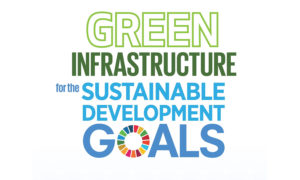Événement Conférence
Infrastructure Innovations as Solutions to Environmental Challenges
On 5 September 2018, the UN Environment Programme and the University of Geneva, through the Geneva Environment Network, hosted an insightful lecture by visiting Harvard Professor Spiro Pollalis.
The lecture explored the multiple dimensions of innovation in connection to sustainable infrastructure by highlighting five infrastructure innovations as key enablers for delivering the global sustainability goals.
- Tools for Measuring Sustainability
- Synergies for Sustainable Cities
- Disruptive Technologies in Redefining Infrastructure
- Digital Design and Simulation Tools
- Enabling Innovation through Procurement
Key Messages
- The finite resources on Earth are not enough to sustain the exponentially increasing population. At the same time, there is a misalignment in investment in infrastructure and soaring demand. Efficient and effective innovation is key in addressing these challenges.
- Sustainability rating tools are vital in ensuring the sustainability of infrastructure through measurement, quantification and subsequent comparison and improvement. The Zofnass Program for Sustainable Infrastructure at Harvard has developed two methodologies, the Envision® Rating System and the Zofnass Sustainable Planning Guidelines, which focus on the project and city levels, respectively.
- Essential synergies must be identified between the sub-sectors of infrastructure and such sub-sectors should be integrated in order to reduce demand for resources and formulate closed circuit and self-sufficient city systems. Hellinikon former airport of Athens, Greece and DHA City Karachi in Pakistan are illustrative case studies of a systems-thinking approach to infrastructure.
- Performance-orientated, disruptive technologies are a game changer and key component in the restructuring of infrastructure implementation. New technologies offer new possibilities and planners and designers should step away from a reliance on historical and prescriptive approaches.
- Digitalization offers a unique opportunity in infrastructure planning and design through ‘digital twin’ models, which through simulation and big data improve performance and predict potential vulnerabilities.
- The entire procurement process from project planning to completion must incorporate core sustainability principles at each component of the cycle. Early participation of professionals and consultation to the client allow the selection of the right project and were cited as crucial to the success of both the US 84 Mississippi River Bridge and the AlexRenew Nutrient Management Facility in Alexandria, Virginia.
- The presentation inspired a fruitful discussion covering strategies on the prioritization of sub-sectors of infrastructure and the capacity to scale-up to the regional level. There was also an exploration of the role of negotiated contracts in the procurement process, along with the importance of clearly identified economic benefits to sustainable infrastructure.
Documents
Video
The event was live on Facebook. (part 1, part 2)

